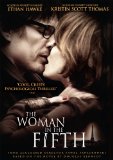| Reviews & Columns |
|
Reviews DVD TV on DVD Blu-ray 4K UHD International DVDs In Theaters Reviews by Studio Video Games Features Collector Series DVDs Easter Egg Database Interviews DVD Talk Radio Feature Articles Columns Anime Talk DVD Savant Horror DVDs The M.O.D. Squad Art House HD Talk Silent DVD
|
DVD Talk Forum |
|
|
| Resources |
|
DVD Price Search Customer Service #'s RCE Info Links |
|
Columns
|
|
|
Woman in the Fifth, The
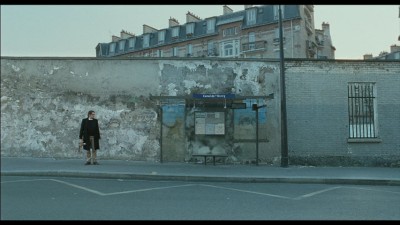
I very much enjoyed The Woman in the Fifth, director Pawel Pawlikowski's long-delayed followup to his accomplished, fascinating My Summer of Love (2004). But some caution is in order before I go claiming that every viewer will be as drawn in as I was: I tend to be very forgiving about whether or not the events depicted in a film make any kind of logical or rational sense, or whether or not every enigma is settled by the end, and though many are willing to acknowledge that the ultimate inscrutability of a classic like The Big Sleep is actually an important element of its endless appeal and fascination, the same tolerance seems less widespread for even more un-pin-downable cinematic greatness like Mulholland Drive or even the recent The Master. So, though I don't share their feelings on these matters, I'll shorthand it out of recognition and respect for the fact that some perfectly intelligent and open-minded audience members are bound to feel cheated by the anti-literal, irrational terms that Pawlikowski offers: If things being left wide, wide open at the end of a film bothers you, or the inability to trace many (if not all) causes and effects for a satisfactory explanation of "what happened" in the movie or what it means angers you, The Woman in the Fifth is to be steadfastly avoided. If, on the other hand, you count yourself a fan of David Lynch or the earlier, claustrophobic/paranoid/absurdist works of Roman Polanski (Knife in the Water, Repulsion, you'll likely be spellbound. The film has unfortunately been marketed as some sort of erotic thriller (that really is cheating), but it's absolutely and innately an art film; the kind of mystery it contains is fated to be left unsolved, growing ever more obscure as its adherence to any rules of waking logic and realist rationalism disappears bit by bit, and the "thrills" it offers are exclusively of the variety offered by sensual, intuitive, very well-done surrealism.
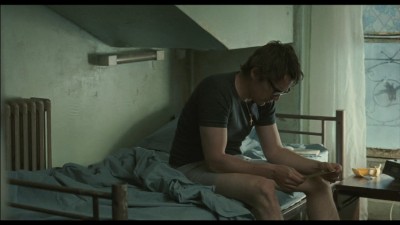
Tom Ricks (Ethan Hawke), a nebbishy American novelist who has yet to make good on the promise of his well-received, long-ago first book, arrives in Paris to try to straighten out his life: Here lives his bitterly estranged wife and the little daughter, Chloé, to whom he is devoted and hopes to remain a good father. After said wife (who, perhaps significantly, tells Tom "you're not normal" in response to his request for them to discuss his visitation rights "like normal people") sics the police on him for his increasingly frantic insistence on seeing Chloé, he's reduced to lurking surreptitiously near his child's school playground to speak to and play with her. Meanwhile, however, Tom's trip to Paris, which was never going to be a day at the Louvre, inexorably degenerates into a Kafkaesque ordeal: All his possessions and money are stolen when he ill-advisedly falls asleep on the back of a city bus, and he finds himself bartering for lodging in a slummy hotel in the rundown Parisian outskirts and working a very odd nighttime security job watching a closed-circuit monitor at some desolate industrial building for the hotel's calmly intimidating proprietor (Samir Guesmi, Tell No One), who has demanded Tom's passport as collateral, and of whom Tom's object of affection and desire, the hotel's Polish-immigrant barmaid, Ania (Joanna Kulig, Elles), is instinctively afraid; apparently, she's supposed to belong to the boss. Tom's tiny, rundown room is depressing, and his neighbor, with whom he shares a bathroom, is belligerent, noisy, and refuses to flush the toilet; Tom's life would seem to have hit a real low.
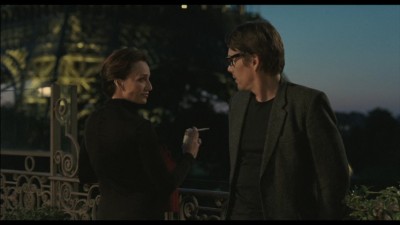
By contrast, Margit (Kristin Scott Thomas) -- the very mysterious, sophisticated woman Tom meets at a "literary" cocktail soirée to which his small renown as a novelist has gotten him invited -- inhabits a cerebral, artistic world set far above Tom's current station (the world, as mentioned in the title, of Paris's tonier/more intellectual fifth arrondissement); she's an established, effortless grande-dame presence in this stratum of Parisian society -- a woman very familiar with and equipped to handle the emotional, and physical, needs of a writer like Tom. Our protagonist is pulled between the dark, creatively enriching passion of his affair with the worldly Margit and his attraction to the sweet, lighter, more naïve vulnerability of Ania. When Tom's awful neighbor tries to blackmail him, threatening to tell the proprietor of his and Ania's affair, and is soon thereafter found murdered in the same contested bathroom he's shared so uncivilly with his neighbor, Tom becomes the prime suspect. That turn of events throws Tom's life, already very strangely precarious, into a tailspin: Margit, his only alibi, turns out to be far, far from what she'd seemed; Tom's longing for a paternal relationship with Chloé haunts him like a specter; and whether or not Tom will crack becomes, finally, a question less of if than of when.
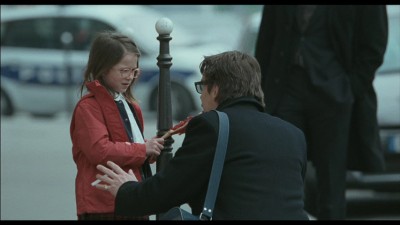
Pawlikawski, who certainly acquitted himself nicely when navigating some of My Summer of Love's more surreal waters, hones in on whatever strengths Hawke (who carries the film near-exclusively, performance-wise) and Thomas have, eliciting strong performances that do give us some emotional and physical reference point for the film's increasingly inexplicable goings-on. Love or hate Mr. Hawke, he is, as he demonstrated unforgettably in Before the Devil Knows You're Dead, very well capable of playing pitiable haplessness verging on impotent rage (his "fluent" but badly-spoken French, intentional or not, actually works to enhance this). Thomas, for her star-turn supporting-role part, is the sinisterly graceful, imperturbable femme fatale, a near-ghostly presence whose aura hints at equal parts allure and dread. Pawlikawski and his longtime cinematographic collaborator Ryszard Lenczewski (also DP on Kenneth Lonergan's Margaret) do a better job of using the less-glamorous parts of the City of Light as a maze of ever-deepening trouble than even Polanski himself did in his similarly Paris-set nightmare, Frantic: In The Woman in the Fifth, The Eiffel Tower is not much more than a fleeting blur seen out the corner of your eye as a bus or taxi speeds you toward the slums. (Except, of course, when the coolly upscale Margit is around; she and Tom first meet and talk on an apartment balcony against the not-quite-real-seeming backdrop of the city's most famous structure.) Lenczewski's shallow focus and cloistered-in compositions lend a claustrophobic feel, with Tom often appearing, in long shots, wedged in by the world (walls, fences, trees) around him. Then there's the too-clean, greenish-fluorescent heightened reality of the little room where Tom writes long, long letters to Chloé while working his night shift, monitoring some anonymous doorway via CCTV, buzzing in visitors who have the password; for an additional Lynchian touch, whatever it is these visitors have come to this vast, anonymous concrete building for (which Tom can't know; he's forbidden to leave his locked, windowless security booth) causes the bulb in his lamp to buzz and flicker up and down ominously.
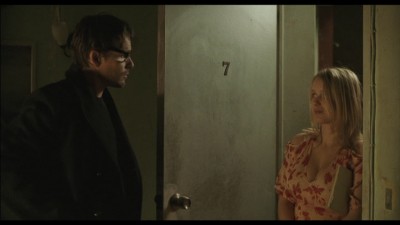
As noted above, what all this "means" is very much open to interpretation. Is the film some nightmarish allegory about an artist being tempted away from everything real by his muse, to sacrifice what is conventionally considered a fulfilling life (family, healthy relationships) for his art? Does his omniscient, omnipotent, yet anxious and unstable position in that little room at night signify the god's-eye view of the writer of fiction? Tom's role as an artist/writer is deciedly salient, but any deciphering will be up to individual viewers' impressions. As with all the best surrealists, however (the Bunuel of Belle de Jour definitely comes to mind), Pawlikawski never stages or shoots anything -- however implausible, bizarre, or puzzling -- with anything less than calm, straightforward conviction, without signaling whether this or that occurrence is "real"; it's always done with a skill and aesthetic assurance that makes the film all the more disconcerting and seductive for playing its cards so close to its vest, never overtly giving away whether what we're seeing is or is not the fevered, paranoid visions of a writer going mad (or giving himself up to his creative imaginings; it may be the same thing). Trying to make sense of The Woman in the Fifth is thus ultimately futile, but if you let it work its own magic on its own plane, that won't matter; it's a hallucination made so vivid through supple, confident, and visually arresting storytelling that it overpowers and immerses you, and if you can get on its wavelength, it's likely a rabbit hole you'll want to go back down for a second, third, or fourth visit.
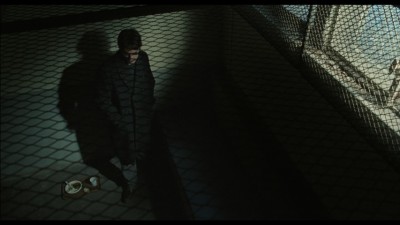
THE DVD:
Overall, the transfer -- which preserves the film's original theatrical aspect ratio of 1.85:1, presented widescreen/anamorphic here -- is quite good. The film's muted color palette remains solid, skin tones look good, and blacks and dark scenes are free of any very noticeable crushing. The drawbacks are some very, very faint edge enhancement and a bit of moderate aliasing here or there. Overall, a good presentation that does well by the intentionally dimmed, shadowed look of the film.
Sound:There are a total of four soundtracks: The film's intended English and French soundtrack (with optional English subs for the French dialogue), both in Dolby Digital 5.1 surround and 2.0 stereo versions; and the same two options for an "alternate English only" track with horrible, obvious dubbed-over English in place of the bits actually recorded in French while filming. The latter two you can certainly dispense with, unless you're illiterate or a masochist (the only reasons to ever knowingly watch a dubbed-over version of a foreign-language movie when subs are available). The two versions of the original track are the only ones worth any attention, and they attain aural excellence; there is no imbalance or distortion to be heard, layered levels of sound in certain scenes are kept perfectly calibrated (including all music and ambient noise when they appear), and all dialogue is immediately present, resonant, and clear.
Extras:--"The Making of The Woman in the Fifth," a 23-minute featurette that goes above and beyond the usual advertisement/making-of territory, combining sit-down interviews with Hawke, Thomas, and Pawlikowski with candid behind-the-scenes footage from the shoot to yield some very good insights into the creative and technical process of making the film. (If you're hoping for a key to "solve" its puzzle, however, you're out of luck; Hawke himself claims that he didn't understand the script, though it was intriguing and engaging enough that he had to do it.)
--The film's rather misleading theatrical trailer (though, to be fair, it's obviously simpler to inaccurately represent and market it as some kind of "erotic thriller" than the rich, puzzling slice of surrealism it actually is).
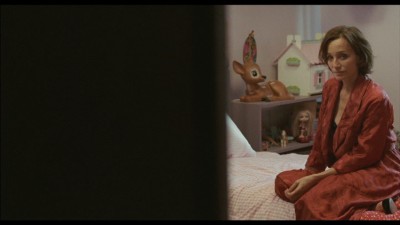
A haunting puzzle that intentionally leaves more than one of its pieces missing, A Woman in the Fifth has the potential to be either a frustratingly unsolved mystery or a haunting, enthralling descent into one man's claustrophobic half-madness; in director Pawel Pawlikowski's talented, intelligent, and frequently inspired hands, it's the latter. We follow along with an increasingly desperate American in Paris, novelist Tom Ricks (Ethan Hawke), as he is torn between his fatherly, husbandly, creative, and erotic desires and the lines between reality and his private hell become so blurred as to be indistinguishable; Pawlikowski's skill with images, tone, and pacing, along with the confident performances he elicits from Hawke (and Kristin Scott Thomas, as the extremely mysterious cipher-woman of the title), make it an endlessly fascinating journey, despite (and at least in part because of) its progressively more stubborn refusal to make any kind of conventional, cause-and-effect sense. Pawlikowski, like his countryman/fellow cinematic emigré Roman Polanski, has a surrealist streak a mile wide (as his previous film, 2004's My Summer of Love, nicely attests), and even though you don't fully understand it (and you suspect he doesn't, either), The Woman in the Fifth puts you under its spell and holds you there until a final moment that will have you vacillating for days about what "really happens" at the end. The film follows an unpredictable, and perhaps haphazard, dream-logic, but it presents you with a dream/nightmare so vivid, relentless, and skillfully, beautifully evoked that, like Alice through the looking glass, you can't resist going following along around the next unpredictable, quite possibly nonsensical bend as Pawlikowski subtly but insistently lets things get curiouser and curiouser.... Recommended.
|
| Popular Reviews |
| Sponsored Links |
|
|
| Sponsored Links |
|
|
| Release List | Reviews | Shop | Newsletter | Forum | DVD Giveaways | Blu-Ray | Advertise |
|
Copyright 2024 DVDTalk.com All Rights Reserved. Legal Info, Privacy Policy, Terms of Use,
Manage Preferences,
Your Privacy Choices | |||||||









